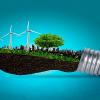News
Displaying Results 326 - 341 of 341
With climate and biodiversity loss heading the news these days, another problem related to the planet we all share is often forgotten: air pollution. Air pollution has an enormous burden on public health, ecosystems, climate, and ultimately, the economy. Globally, the World Health Organization (…
Circular economy transformation is a new area of cooperation between the United Nations Economic Commission for Europe (UNECE) and the Government of Tajikistan. Under the overarching leadership of the Ministry of Economic Development and Trade, UNECE together with the UN Tajikistan, and in…
Countries in the Caucasus, Central Asia, Eastern and South-Eastern Europe are stepping up efforts for their sustainable energy transition with ambitious plans and policies, aiming to significantly cut CO2 emissions and advance implementation of the Sustainable Development Goals (SDGs) and the Paris…
How can the creation of more interconnected transport systems support progress towards the Sustainable Development Goals? How can we enable the seamless combination of different modes of transport for passengers and freight - be it bus to train or truck to boat – fostering transport that is…
Waste is a challenge waiting to be transformed into an opportunity that can help achieve the goals of the 2030 Agenda for Sustainable Development.Health and environmental risksOn 14 April 2017, as Sri Lanka was celebrating its traditional new year, a mountain of waste lying on the northeastern…
2016 Aarhus week - How the Aarhus Convention contributes to sustainable development The three pillars of the UNECE Aarhus Convention - access to information, public participation in decision-making and access to justice in environmental matters - are universal environmental rights…
Every day there are hazardous chemical substances released into the environment from industrial or agricultural sites that can affect our daily lives. Pollutant Release and Transfer Registers (PRTRs) help to effectively record these pollutants and make this information accessible to the public…
The participants in the twenty-second meeting of the Working Group of the Parties to the UNECE Convention on Access to Information, Public Participation in Decision-making and Access to Justice in Environmental Matters (Aarhus Convention), held in Geneva from 19 to 21 June 2018, considered a wide…
A circular economy is an economy that keeps pollution and waste out of the system, maintains products and materials in use, and regenerates natural resources. It promotes resource and energy efficiency, reduces food waste along the whole supply chain, builds sustainable infrastructure, and…
All too often we take the air we breathe and share for granted. Only when we breathe very polluted air, when we can smell and see the pollution, do we realize that the air around us is a precious good that needs to be protected, much like the water we drink. On the International Day of Clean Air…
At what point do we cease to be alarmed by a shocking reality? Many of you may already be familiar with the following figures, from the last WHO Global Status Report on Road Safety (2018).
Every year 1.3 million people are killed and around 50 million injured on the world’s roads, often with…
The extraction of raw materials worldwide has more than doubled since 1990 and could double again by 2060 in the absence of corrective policies. According to the UN International Resources Panel, resource extraction and processing account for 90% of global biodiversity loss and water stress impacts…
Ambition turns into practice in BudvaThe transformation of our world starts today. The 2030 Agenda for Sustainable Development and environmental democracy are at the centre of the Meetings of the Parties to the UNECE Convention on Access to Information, Public Participation in Decision-making…
In view of the upcoming COP 27 of the UNFCCC, taking place in Egypt later this year, the growing threats on climate created by the textile and leather sectors call for our urgent action. If we continue down this path, we will fail by 50% to meet our 2030 emissions reduction targets, resulting in…
Mobility is a primary enabler of our economic and social life. However, despite its many benefits, the costs of mobility to societies around the world remain unacceptably high. These include greenhouse gas emissions (transport accounts for some 24% of global CO2 emissions, three quarters of which…
The public and civil society have a crucial role to play in tackling key environmental challenges. To make the most of this potential, continued efforts are needed to uphold their rights to shape environmental decision-making.
To this end, the Working Group of the Parties to the Convention on…









